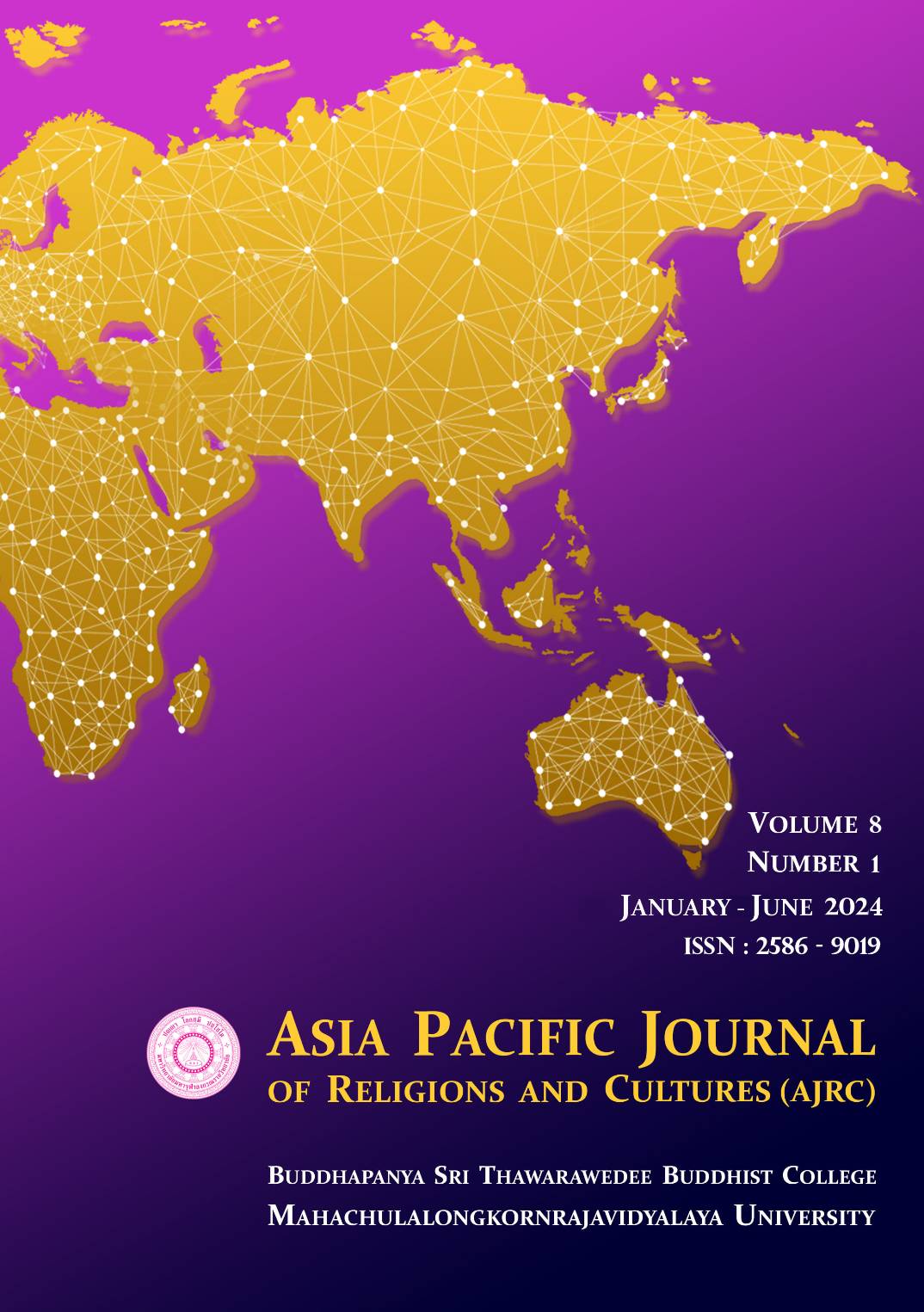The Development of an Instructional Model to Improve Student Feedback Literacy in Blended Learning Environments at Vocational Colleges in Guangxi, China
Main Article Content
Abstract
The impact of providing feedback on student performance has been possessed the potential to yield substantial enhancements in learning outcomes. This study aimed to develop an instructional model to improve student feedback literacy at a vocational college in Guangxi, China. The acquisition of qualitative data involved conducting an extensive literature review, which was subsequently scrutinized to integrate the indispensable skills and the strategies influencing student feedback literacy. A questionnaire was created and circulated among 1203 students in three vocational colleges, with the aim of gathering quantitative data. The findings showed high levels of student feedback literacy in the three targeted schools, Mean 3.63, S.D. .995. Simultaneously, the strategies that influence student feedback literacy were found to be online and offline teacher feedback, online and offline peer feedback, feedback files, and authentic feedback. The findings of the survey also indicated a positive correlation between the aforementioned six strategies and the enhancement of student feedback literacy.
Article Details

This work is licensed under a Creative Commons Attribution-NonCommercial-NoDerivatives 4.0 International License.
References
Boud, D. (2020). Sustainable assessment: Rethinking assessment for the learning society. Studies in Continuing Education, 22 (2):151-167.
Boud, D., & Dawson, P. (2021). What feedback literate teachers do: an empirically-derived competency framework. Assessment & Evaluation in Higher Education, 1-14. https://doi.org/10.1080/02602938. 2021.1910928.
Carless, D. (2005). Prospects for the implementation of assessment for learning. Assessment in Education: Principles. Policy & Practice, 12(1), 39-54. DOI:10.1080/0969594042000333904.
Carless, D. (2015). Excellence in university assessment: Learning from award-winning practice. Routledge.
Carless, D., & Boud, D. (2018). The development of student feedback literacy: enabling uptake of feedback. Assessment & Evaluation in Higher Education, 43(8), 1315-1325.
Carless, D. (2019). Feedback loops and the longer-term: towards feedback spirals. Assessment & Evaluation in Higher Education, 44(5), 705-714.
Carless, D., & Winstone, N. (2020 b). Teacher feedback literacy and its interplay with student feedback literacy. Teaching in Higher Education, 114. https://doi.org/10.1080/13562517.2020.1782372.
Carless, D. (2022). From teacher transmission of information to student feedback literacy: Activating the learner role in feedback processes. Active Learning in Higher Education, 23(2), 143-153 https://doi.org/10.1177/1469787420945845.
Carless, D., & Winstone, N. (2023). Teacher feedback literacy and its interplay with student feedback literacy. Teaching in Higher Education,28 (1), 150-163.
Clark A. (1999). An embodied cognitive science? Trends in Cognitive Sciences, 3(9), 345- 351.
Chan, C. K. Y., & Luo, J. (2021). Exploring teacher perceptions of different types of ‘feedback practices in higher education: implications for teacher feedback literacy. Assessment & Evaluation in Higher Education,47(1), 61-76, https://doi.org/10.1080/02602938.2021.1888074.
Chong, S. W. (2021). Reconsidering student feedback literacy from an ecological perspective. Assessment & Evaluation in Higher Education, 46(1), 92-104.
Dawson, P., Carless, D., & Lee, P. P. W. (2021). Authentic feedback: supporting learners to engage in disciplinary feedback practices. Assessment & Evaluation in Higher Education, 46(2), 286-296.
Dong, Y., Li, X.Y., Zheng, Y.F. & Zhai, X.S(2021). Research on Human-machine Two-way Feedback Mechanism Oriented to Intelligent Educational Applications. Open Education Research, 27(2), DOI:10.13966//j.cnki.kfjyyj.2021.02.003.
Dong, Y., Luo, Z.L., Yang, Y.Y., & Wang, Y. (2021). Research on Teachers’ Feedback Literacy from the Perspective of Educational Informatization 2.0. Educational Informationization. 340(8), DOI: 10.13811/j.cnki.eer.2021.08.005.
Evans, A. M. (2011). Governing student assessment: Administrative rules, silenced academics and performing students. Assessment & Evaluation in Higher Education, 36(2), 213–223.
Garrison, D. R., & Kanuka, H. (2004). Blended learning: Uncovering its transformative potential in higher education. The Internet and Higher Education, 7(2), 95–105.
Garrison, D.R., &Vaughan, N.D. (2008). Blended learning in higher education-framework, principles, and guidelines. San Francisco. Jossey-Bass.
Gravett, K. (2022). Feedback literacies as socio-material practice. Critical Studies in Education, 63(2), 261–274.
Han, Y., & Xu, Y. (2020). The development of student feedback literacy: the influences of teacher feedback on peer feedback. Assessment & Evaluation in Higher Education, 45(5), 680–696.
Han, Y., & Xu, Y. (2021). Student feedback literacy and engagement with feedback: a case study of Chinese undergraduate students. Teaching in Higher Education, 26(2), 181–196.
Hattie, J., & Timperley, H. (2007). The power of feedback. Review of Educational Research, 77(1), 81–112.
Hounsell, D. (2007). Towards more sustainable feedback to students. In Rethinking assessment in higher education, ed.
Malecka, B., Boud, D., & Carless, D. (2020). Eliciting, processing and enacting feedback: mechanisms for embedding student feedback literacy within the curriculum. Teaching in Higher Education, pp. 1–15. https://doi.org/10.1080/13562517.2020.1754784 .
Molloy, E., Boud, D., & Henderson, M. (2020). Developing a learning-centered framework for feedback literacy. Assessment & Evaluation in Higher Education, 45(4), 527–540.
https://doi.org/10.1080/02602938.2019.1667955
Naomi, E., Winstone, Robert., A, Nash., Michael, Parker. & James Rowntree (2017). Supporting Learners' Agentic Engagement with Feedback: A Systematic Review and a Taxonomy of Recipience Processes. Educational Psychologist, 52:1, 17-37,
DOI: 10.1080/00461520.2016.1207538.
Nicol, D., Thomson, A., & Breslin, C. (2014). Rethinking feedback practices in higher education: A peer review perspective. Assessment & Evaluation in Higher Education, 39(1), 102-122.
O’Donovan, B. (2017). How student beliefs about knowledge and knowing influence their satisfaction with assessment and feedback. Higher Education, 74(4), 617-633.
Pitt, E., Bearman, M., & Esterhazy, R. (2019). The Conundrum of Low Achievement and Feedback for Learning. Assessment & Evaluation in Higher Education, 45(2), 239–250, https://doi.org/10.1080/02602938.2019.1630363.
Shute, V.J. (2008). Focus on formative feedback. Review of Educational Research, 78(1), 153-89. https://doi.org/10.3102/0034654307313795
Winstone, N. E., & Carless, D. (2019). Designing effective feedback processes in higher education: A learning-focused approach. Routledge.
Zhan, Y. (2022). What do college students think of feedback literacy? An ecological interpretation of Hong Kong students’ perspectives. Assessment & Evaluation in Higher Education. 48(5), 686-700. https://doi.org/10.1080/02602938.2022.2121380.


